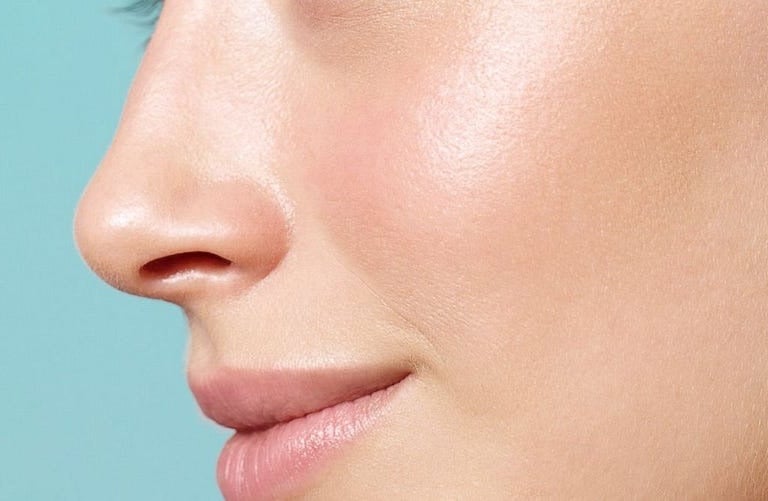Dermatologist's Tips for Taking Care of Dry and Combination Skin at for Men and Women
Transform Your Skin Today
Care for Dry and Combination Skin at Home
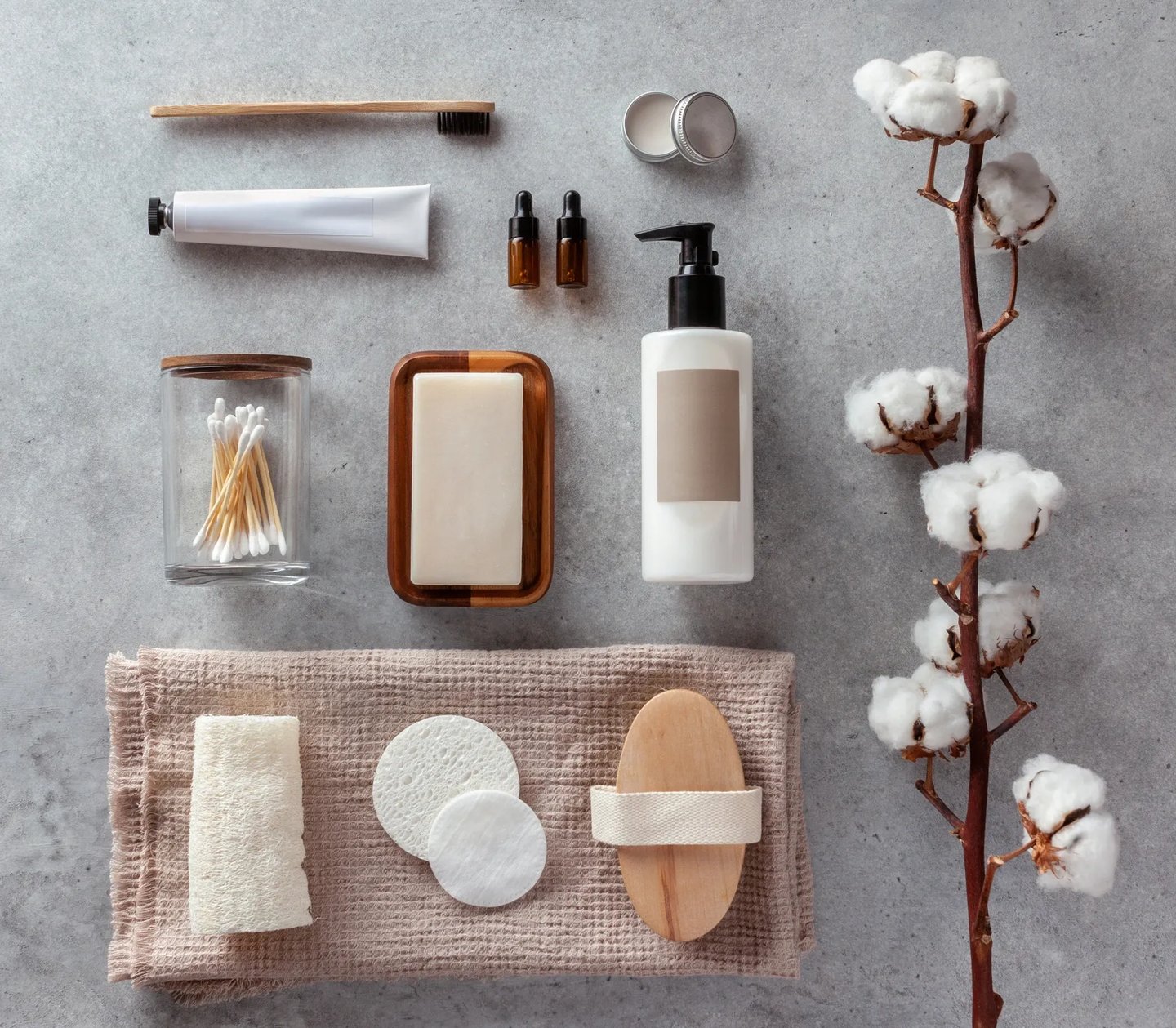

Rituals for Smooth and Hydrated skin
Skin Care Is Important

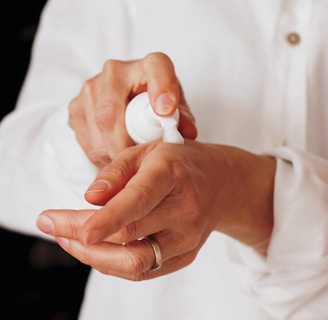
About Skin Care
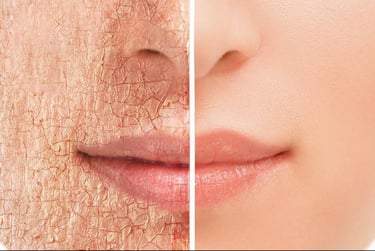

FACIAL CARE
Dry facial skin care — tips for a healthy and radiant look
1 Gentle cleansing
Use mild cleansers without harsh surfactants. Avoid soaps and products with alcohol — they dry out the skin. It’s better to choose creamy cleansers or hydrophilic oils.
2 Intensive hydration
Choose creams and serums with hyaluronic acid, glycerin, and natural oils (jojoba, avocado, shea). They retain moisture and nourish the skin from within.
3 Regular nourishment
Apply nourishing masks 1–2 times a week with aloe, oatmeal, honey, or avocado. They help restore the skin’s lipid barrier.
4 Protection from external factors
Dry skin is especially vulnerable to cold, wind, and sun. Use a moisturizing cream with SPF even on cool and cloudy days.
5 Avoid hot water
Hot water breaks down the skin’s protective layer. Wash your face with warm or cool water to prevent extra dryness.
6 Drink water and maintain a healthy diet
Hydration from inside is key for skin health. Drink enough water and include foods rich in vitamins A, C, and E.
7 Use a humidifier
During heating seasons, indoor humidity drops, worsening dry skin. A humidifier helps maintain a comfortable microclimate.
Following these simple tips will help your dry skin look fresh, soft, and well-hydrated!
BODY CARE
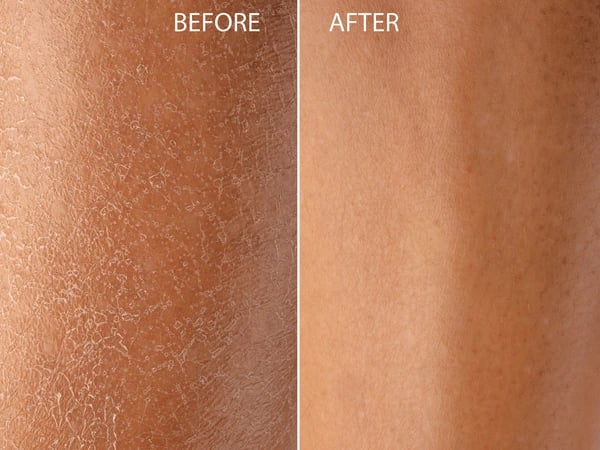

Tips for Caring for Dry Body Skin at Home
1 Gentle Cleansing
Use shower gels and foams without harsh detergents and aggressive surfactants. Avoid soap and very hot water to protect the skin’s natural lipid barrier.
2 Intensive Hydration
Apply moisturizers on slightly damp skin after showering. Choose lotions and creams with glycerin, ceramides, shea butter, coconut, or almond oils — they retain moisture and nourish the skin.
3 Regular Nutrition and Repair
Use nourishing masks or oils (e.g., avocado, jojoba, or argan oil) 1–2 times a week for deep nourishment and to restore the protective layer.
4 Avoid Hot Water
Hot water dehydrates and worsens dryness. Use warm water for baths and showers instead.
5 Protection from External Factors
Wear protective clothing in cold weather to shield skin from wind and cold, which increase dryness.
6 Maintain Hydration from Within
Drink enough water and include foods rich in vitamins A, C, E, and omega-3 fatty acids for skin health.
7 Use a Humidifier
Dry indoor air, especially during heating season, worsens skin dryness. A humidifier helps maintain moisture levels.
Following these simple rules will help keep your skin soft, elastic, and well-hydrated!
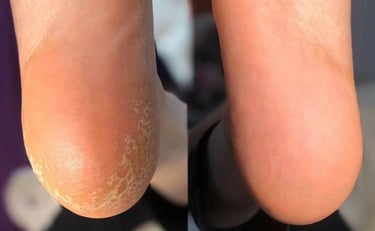

FOOT CARE
Professional Tips for Foot Care at Home
1. Regular Cleansing
- Wash your feet with warm water and mild soap 1–2 times a day.
- Dry thoroughly, especially between the toes, to prevent fungal infections.
2. Exfoliation
- Use a pumice stone or scrub 1–2 times a week to remove dead skin.
- Avoid overdoing it to prevent skin damage.
3. Moisturizing
- Apply moisturizing cream daily, especially after washing.
- For dry and cracked skin, choose creams containing urea or glycerin.
4. Proper Pedicure
- Trim nails straight across following the shape of the toe, avoiding cutting too short.
- Do not cut the cuticle; gently push it back if needed.
5. Antiseptic Care and Problem Treatment
- Treat cracks and calluses with antiseptic solutions.
- Use antifungal treatments if you suspect an infection to prevent fungus.
6. Air and Shoe Hygiene
- Wear quality, breathable shoes and change socks daily.
- Disinfect shoes if there is an unpleasant odor or excessive sweating.
7. Regular Inspection
- Monitor the skin and nails, especially if you have diabetes or circulation issues.
- Consult a doctor if you experience pain, redness, severe peeling, or other unusual symptoms.


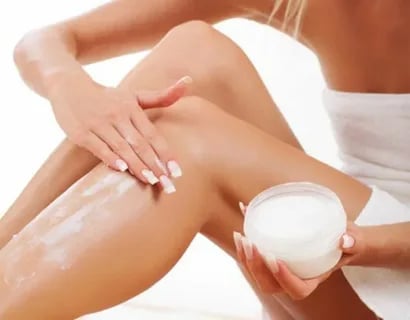





Cleanse Gently
Use a mild, fragrance-free cleanser suited to your skin type.
Avoid scrubbing too hard; use lukewarm water and gently pat dry.
Moisturize Daily
Apply moisturizer immediately after bathing to lock in hydration.
Choose products with ceramides, hyaluronic acid, or glycerin.
Protect with Sunscreen
Wear broad-spectrum SPF 30+ sunscreen every day, even when indoors or in winter.
Reapply every 2 hours if outdoors.
Avoid Hot Showers
Hot water strips skin of natural oils; use warm water instead.
Don’t Over-Exfoliate
Limit exfoliation to 1-2 times a week, using gentle scrubs or chemical exfoliants.
Over-exfoliating can cause irritation and dryness.
Stay Hydrated
Drink plenty of water throughout the day for skin health.
Eat a Balanced Diet
Consume foods rich in antioxidants, healthy fats, and vitamins (like fruits, vegetables, nuts, and fish).
Practice Good Hygiene
Change pillowcases and towels regularly.
Avoid touching your face with dirty hands.
Address Skin Concerns Promptly
Don’t pick or squeeze pimples; this can lead to scarring.
Use over-the-counter treatments with benzoyl peroxide or salicylic acid for mild breakouts.
Be Consistent
Stick to a routine; results take time.
Watch for Allergies and Sensitivities
Patch-test new products before using them fully.
Avoid products with alcohol, heavy fragrances, or harsh chemicals if you have sensitive skin.
Get Enough Sleep
Aim for 7-9 hours of sleep each night to allow skin to repair.
Manage Stress
Practice stress-reducing activities like exercise, meditation, or hobbies.
Consult a Dermatologist When Needed
If you have persistent skin issues, see a professional for advice and treatment.
Extra Tip:
For body skin, use gentle body washes, moisturize after every shower, and wear protective clothing in the sun.
By following these dermatologist-approved tips, you can maintain healthy, glowing skin at home!
Dermatologist's Tips for Taking Care of Dry
and
Combination Skin for Men and Women
Professional Podologist (foot care specialist) Tips for Nail Care and Preventing Fungal Infections on the Feet
Keep Feet Clean and Dry
Wash your feet daily with mild soap and water, making sure to clean between the toes.
Dry thoroughly, especially between the toes, to prevent moisture buildup.
Trim Nails Properly
Cut toenails straight across to prevent ingrown nails.
Avoid cutting nails too short; leave a small free edge.
Use clean, disinfected nail clippers or scissors.
Moisturize Carefully
Apply moisturizer to the tops and bottoms of feet, but avoid the area between toes to reduce fungal risk.
Choose Breathable Footwear
Wear shoes made of natural materials (like leather or mesh) that allow air circulation.
Change socks daily, and choose moisture-wicking materials.
Practice Good Hygiene in Public Spaces
Always wear sandals or flip-flops in public showers, pools, and locker rooms.
Avoid sharing towels, nail clippers, or shoes with others.
Inspect Feet Regularly
Check your feet and nails for changes in color, texture, or thickness.
Watch for signs of infection such as redness, swelling, or foul odor.
Prevent Excess Moisture
Use antifungal foot powder if you sweat a lot.
Change out of wet shoes and socks as soon as possible.
Treat Nail Injuries Promptly
Disinfect any cuts or injuries to the nail or surrounding skin.
Seek professional help if the nail becomes painful, discolored, or thickened.
Avoid Nail Polish During Infections
If you suspect a fungal infection, avoid using nail polish or artificial nails, as they trap moisture and worsen the problem.
Seek Professional Care
Consult a podologist or dermatologist for persistent nail problems or suspected fungal infections.
Professional treatment may include antifungal medications or nail debridement.
Maintain Overall Foot Health
Keep blood sugar levels under control if you have diabetes, as foot problems are more common.
Don’t ignore minor symptoms; early treatment prevents complications.
Summary:
Consistent hygiene, proper nail trimming, moisture control, and professional consultations are key for healthy nails and preventing fungal infections on the feet.






Based on expert reviews and editor recommendations, here are the top 10 body creams of the last two years (2023–2025)
Olay Body Lotion for Women, Firming with Collagen Peptides Serum
Visibly firms skin, deeply hydrates, absorbs fast, with Vitamin B3 complex.
NIVEA Cocoa Butter Body Cream for Dry Skin with Hyaluronic Acid
Intense hydration, heals dry skin, rich in cocoa butter and hyaluronic acid.
Advanced Clinicals Manuka Honey Body Cream
Soothes, moisturizes, calms irritation with manuka honey.
La Roche-Posay Lipikar AP+ Triple Repair Moisturizing Cream
Repairs and nourishes sensitive, very dry skin.
Fenty Skin Butta Drop Whipped Oil Body Cream
Luxurious whipped oil, deeply hydrating, ideal for dry skin.
Beauty Pie Super Healthy Skin Deluxe Body Crème
Quickly absorbed, long-lasting hydration, subtle glow.
Glossier Body Hero Daily Perfecting Lotion
Smooths, brightens skin, lightweight for daily use.
Necessaire The Body Cream
Nourishing, fragrance-free, dermatologist recommended for sensitive skin.
CeraVe Moisturizing Cream
Ceramide-rich, repairs barrier, great for dry and sensitive skin.
Vaseline Intensive Care Cocoa Radiant Body Lotion
Deep hydration, restores glow, budget-friendly.
These creams combine science-backed ingredients, high user ratings, and dermatologist endorsements, making them top choices for a variety of skin needs—from firming and anti-aging to sensitive and dry skin care. For more details or reviews, check the sources below:
Top 10
Here are the top 10 face creams that have been newly released or gained significant popularity in the past two years, according to expert and editorial recognition:
Dr. Dennis Gross Skincare Retinol + Ferulic Wrinkle Cream
Multitasking cream for fine lines, wrinkles, and hyperpigmentation; plumps and smooths skin with retinol and ferulic acid
Isdin Isdinceutics Age Contour Night Face and Neck Cream
Transformative night cream targeting firmness, elasticity, and rejuvenation for face and neck.
CeraVe Skin Renewing Night Cream
Budget-friendly favorite; supports skin barrier and hydrates with hyaluronic acid.
Beauty of Joseon Dynasty Cream
Soothing, non-irritating formula for sensitive skin using traditional Korean ingredients.
Elemis Pro-Collagen Marine Cream SPF 30
Anti-aging benefits plus SPF 30; smooths lines and hydrates while protecting from environment.
Estée Lauder Advanced Night Repair Overnight Treatment
Renowned for radiance, firmness, and cellular renewal during overnight use.
Fresh Lotus Dream Night Cream
Ultra-hydrating botanicals and antioxidants for dry skin and overnight repair.
Kiehl’s Anti-Aging Cream
Firming, lifting, and smoothing for visible skin tightening.
Mother Science Molecular Genesis Barrier Repair Moisturizer
Breakthrough barrier-repair technology for stressed or treated skin.
Augustinus Bader The Rich Cream
Luxurious cream with peptides and renewal factors; visible skin transformation and deep hydration.






Make a Goddess Skin
Goddes Skin
